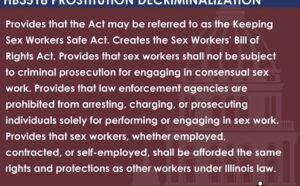By Anna Forbes
In most countries, the concept of sex workers’ human rights has been unthinkable for the last few millennia. Sex workers are generally portrayed as victims or punchlines.
Recent political developments, however, suggest some growing political awareness of sex workers as human beings. On December 20, Canada’s Supreme Court ruled in favor of the plaintiffs in Attorney General of Canada v. Terri Jean Bedford, Amy Lebovitch, and Valerie Scott. These three women, self-identified sex workers, filed suit in 2007 because they felt three provisions in the Canadian Criminal Code violated their constitutional rights.
After six years of weaving its way through the courts, their case resulted in a unanimous decision striking down laws against keeping or being found in a brothel (or “bawdy house,” to use the law’s term), living on the avails (profits) of selling sex, and “communicating in public for the purpose of prostitution” (street soliciting). These provisions, the Court ruled, violated the right to “security of the person” guaranteed by Canada’s Charter of Rights and Freedoms enacted in 1982. The Globe and Mail, Canada’s nationally distributed newspaper, described Chief Justice Beverley McLachlin’s decision (on behalf of the Court) as not being “about whether prostitution should be legal or not, but about whether Parliament’s means of controlling it infringe the constitutional rights of prostitutes.”

Political developments last December suggest some growing political awareness of sex workers as human beings. (Canadian Charter / WikiMedia Commons)
The decision states:
Parliament has the power to regulate against nuisances, but not at the cost of the health, safety and lives of prostitutes. … The prohibitions all heighten the risks. … They do not merely impose conditions on how prostitutes operate. They go a critical step further, by imposing dangerous conditions on prostitution; they prevent people engaged in a risky—but legal—activity from taking steps to protect themselves from the risks.
The Court agreed on a one-year suspension of the ruling to give Parliament time to respond. If lawmakers choose to pursue passage of new prohibitions, they will be obliged, under the ruling, to ensure that they do not violate sex workers’ right to safety.
Keep reading…






 TrafficHolder.com - Buy & Sell Adult Traffic
TrafficHolder.com - Buy & Sell Adult Traffic
Wishful thinking. One good court decision can’t obscure the systematic efforts of a determined cabal of fanatics to eliminate all sex work no matter how many women’s lives are wrecked in the process. They, as usual, will just have to be sacrificed for the welfare of “good” women. This view is held by a certain kind of fanatic to be found at the extremes of both right and left and increasingly by those in the middle they’ve managed to sway. This case was good news and that’s rare in this area, but it was also one isolated situation in one… Read more »